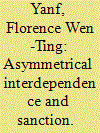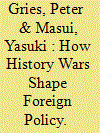| Srl | Item |
| 1 |
ID:
170627


|
|
|
|
|
| Summary/Abstract |
Since China’s economic rise, there has been an upsurge of cases demonstrating that the country has translated its increasing economic capabilities into political influence over other states. The focus of this paper is to investigate the case of China’s economic sanctions on South Korea in response to its Terminal High Altitude Area Defense (THAAD) deployment. Its goal is to deepen our understanding of how China has employed economic coercion in order to alter the policies of other states. China’s economic sanctions have included intentional ones like the Hallyu ban, a ban on tourism, non-tariff measures, the shutting down of Lotte Marts, and the fomenting of anti-Korean sentiment in its official media. There is however insufficient evidence to prove that these boycott movements and reductions in direct investment on the part of Chinese companies are government-mandated sanctions and not simply the choice of individual actors. Our findings indicate that due to its asymmetrical interdependence on China, South Korea was more vulnerable to economic sanctions and thus more likely to make political concessions.
|
|
|
|
|
|
|
|
|
|
|
|
|
|
|
|
| 2 |
ID:
184755


|
|
|
|
|
| Summary/Abstract |
Do history wars shape international affairs? If so, how and for whom? Taking the historical dispute between China and South Korea over the ancient Gaogouli/Goguryeo Kingdom as a case study, this article explores the individual-level psychological micro-foundations of history wars. A 2020 survey experiment in South Korea pit “ours” vs “theirs” Goguryeo imitation Wikipedia entries to explore their downstream consequences. It revealed direct, indirect, and conditional effects. Exposure to China's claim to the Kingdom undermined Korean pride, increasing dislike of China, and lessening desires to cooperate with it. Pre-existing levels of nationalism divided South Koreans in how angry they became after exposure the Wikipedia primes. That anger, however, only shaped the China policy preferences of those South Koreans who viewed the balance of military power with China favorably. Implications for ownership disputes over kimchi and other national possessions are also discussed, as are the implications of history wars for war and peace in twenty-first-century East Asia.
|
|
|
|
|
|
|
|
|
|
|
|
|
|
|
|